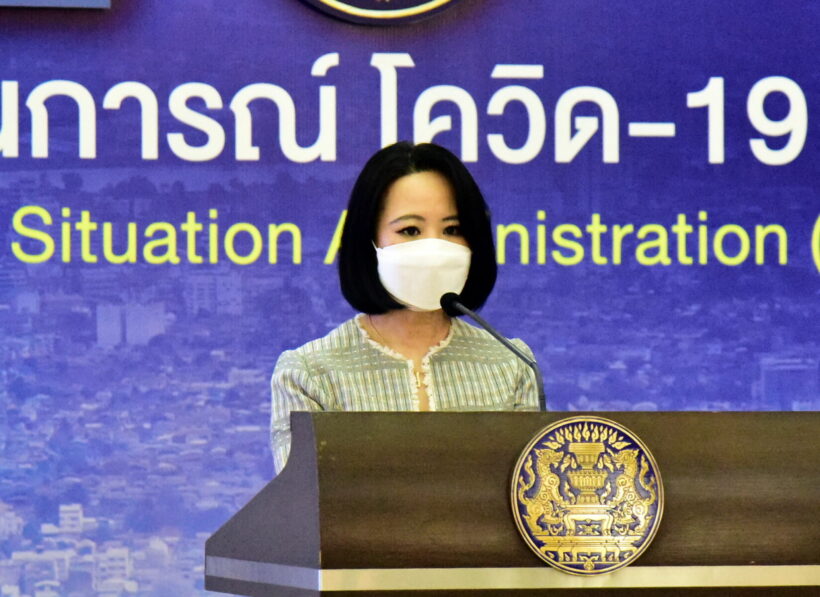Restrictions eased in “dark red” provinces; new “Covid Free” initiative

“Thai officials are shifting their focus to work on ways the public can safely live with the presence of the coronavirus rather than trying to completely eradicate it.”
Disease control measures are easing in Thailand’s “dark red” provinces, the Centre for Covid-19 Situation Administration announced today. Starting September 1, the ban on interprovincial public transportation will be lifted, restaurants will be allowed to offer dine-in services, and other businesses will be allowed to reopen. The 9pm to 4am stay-at-home order in the “dark red” zones remains in effect, according to the Thai government’s news bureau.
The CCSA is also starting a new initiative they call “Covid Free Setting”, requiring customers and staff at “high risk” establishments in “dark red” zones to be vaccinated, or test negative for the virus, to be classified as “Covid Free.” Residents who are fully vaccinated will be eligible for a so-called “Green Pass” while those who test negative, or recently recovered for the virus, can get a “Yellow Pass.”
Businesses and other venues are also advised to abide by the “Universal Prevention Guidelines” (listed below), according to Ministry of Foreign Affairs Department of Information News Division director, Pensom Lertsithichai, who gives the CCSA report in English.
She added that “businesses and organisations that are ready to comply with ‘Covid Free’ settings and these ‘Universal Prevention Guidelines’ may resume their operations as of next month, or September.”
In today’s general CCSA meeting chaired by PM Prayut Chan-o-cha, officials reviewed the current measures and decided to ease measures. Pensom says Thai officials are shifting their focus to work on ways the public can safely live with the presence of the coronavirus rather than trying to completely eradicate it.
Under a model the CCSA is calling “Smart Control and Living with Covid-19,” Pensom says “we are preparing the country for a gradual return to the ‘new normal’ where we learn to co-exist with Covid-19 as we continue our daily lives as normal as possible, also as safely as possible.”
While many people infected with Covid-19 have little to no symptoms, those who are those who are over 60 years old, are pregnant, or have certain underlying health conditions are at risk of severe infection, Pensom says, adding that disease control measures are still needed.
Restrictions eased in “dark red” zones
Interprovincial travel
Interprovincial public transportation, which has been banned in “dark red” zones, will be allowed to resume services starting on September 1. Transportation services will need to operate at 75% of its maximum capacity. Passengers are required to wear masks at all times and the consumption of food and drinks is not allowed. The spokesperson says vans and buses should stop every couple of hours to open the doors and windows to circulate the air.
Restaurants
Restaurants will be allowed to reopen for dine-in services. Restaurants that are either outdoor or have good air circulation can offer dine-in services at 75% of its maximum capacity. Indoor restaurants can offer the services at 50% of its maximum capacity.
Shopping centres
Shopping centres can operate as normal, but some services are restricted. Barber shops and hair salons can only open for haircuts, but can only offer the service up to an hour per customer. Massage parlours can only offer foot massages. Beauty clinics can open to sell products, but cannot offer services. Fitness and sporting facilities outside shopping centres can reopen, but cannot host events with spectators.
Closures
Schools, cinemas, spas, amusement parks, conference centres, and dining halls must remain closed.
“Covid Free Setting”
“Dark red” zones
- Customers visiting businesses classified as a “high risk” for Covid-19 transmission must either have a “Green Card,” certifying that they are fully vaccinated against the coronavirus, or a “Yellow Card,” declaring that they have either recently recovered from the virus or tested negative.
- Staff at businesses classified as a “high risk” for Covid-19 transmission must be fully vaccinated and undergo an antigen test every week.
- The business or venue must ensure social distancing, have good air circulation, and practice hygiene safety.
“Red” zones
- Staff at businesses classified as a “high risk” for Covid-19 transmission must undergo an antigen test each week. The CCSA also recommends that staff are vaccinated against the coronavirus.
- Customers must abide by the standard health practices including hand washing, social distancing, checking temperatures, and mask wearing.
- The business or venue must ensure social distancing, have good air circulation, and practice hygiene safety.
Other areas
- The CCSA also recommends that staff at businesses classified as a “high risk” for Covid-19 transmission are vaccinated against the coronavirus.
- Customers must abide by the standard health practices including hand washing, social distancing, checking temperatures, and mask wearing.
- The business or venue must ensure social distancing, have good air circulation, and practice hygiene safety.
“Universal Prevention Guidelines”
The CCSA is asking the public to follow universal presentation guidelines…
- Only leave your home if travel is essential.
- Practice social distancing of 1 to 2 metres
- Wear a cloth mask over a surgical mask, even when at home with more than two people.
- Wash your hands frequently with soap or sanitiser gel.
- Avoid touching masks as well as the eyes, nose, and mouth.
- Separate personal use items.
- Consume only freshly cooked and hot food.
- Do not share eating utensils or food servings.
- Take frequent rapid antigen tests.
Latest Thailand News
Follow The Thaiger on Google News:


























